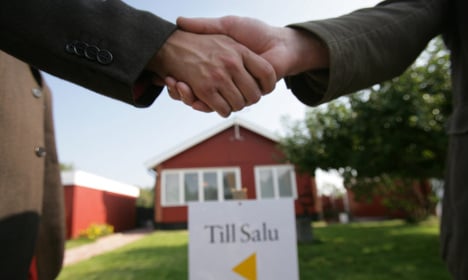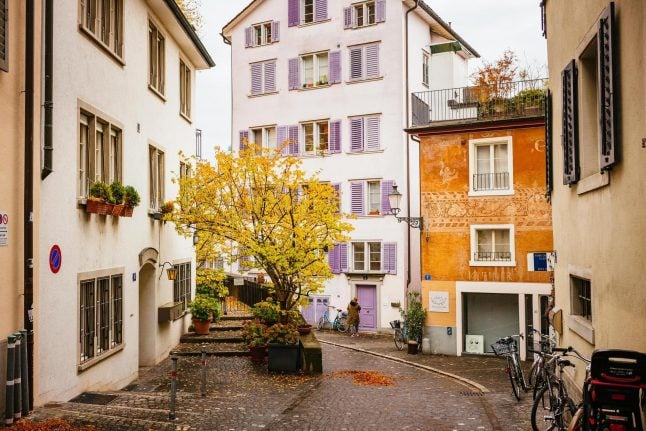1. Can I afford a home in Sweden?
With its chilly winter climate and famously expensive restaurants, Sweden might not seem like the obvious place to move to or buy a holiday home in. But Johan Vesterberg, head of press for Sweden's largest estate agent, Fastighetsbyrån recently told The Local that with just a €100,000 budget (£72,000, $106,009, 933,210 kronor) “you can find a decent property in most parts of the country, it will just be a question of size”, especially if you stay away from the coast and avoid the nation's major cities. And with record-low interest rates, now is the time to strike.
While in many other countries the rules of borrowing are quite simple (letting you borrow, say, up to five times your salary), in Sweden it's a bit more complicated with many factors involved.
Here's a quick example though, according to SBAB's (the nation's state-owned mortgage broker) mortgage calculator. Say you wanted to buy a 50-130 square metre house in Stockholm municipality and were able to pay 10,000 kronor towards it a month (including paying off your mortgage, housing association fees and utilities costs), you would be able to borrow 1,812,254 kronor (85 percent of the property's value) to buy a home for approximately 2,132,064 kronor, paying a cash deposit for the remaining 15 percent.
However, it is not an exact science and you should always discuss potential property purchases with your bank manager or lawyer first.

Swedish dream homes are cheaper than you think. Photo: Johan Willner/imagebank.sweden.se
2. How does the viewing process work?
If you're looking for a home in the Gothenburg, Malmö or Stockholm areas, make sure you approach estate agents as soon as you're thinking of buying. Rising prices and high demand for apartments in Sweden's three largest cities have led to a growing number of properties being sold without public viewings, according to a survey carried out by SBAB.
The shift brings Sweden closer to the approach favoured in other European countries such as the UK, where customers in property hotspots are often granted private viewings. However, the most common approach in Sweden is still for potential customers to attend an open house viewing before they submit their bids for the property.
3. How do I win the bidding war?
Via text message. Yes, you read that right. In tech-savvy Sweden, the bidding process is often done by sending the amount you're willing to pay for the property in an SMS to the property agent until your fellow prospective buyers back out and a price is agreed on.
Rent a home in Sweden with The Local
In many parts of the world, the seller sets the price and then negotiates with potential buyers, with the final price landing somewhere in the middle. In Sweden, buyers try to outbid each other – often resulting in a windfall for the seller. Make sure you meet with your bank beforehand to agree on how high you are able to go as there are no legal regulations on these bidding wars, which tend to push costs well above the asking price – especially in attractive city regions. Tor Borg, chief economist at SBAB told The Local that his main advice for customers was to “keep your head calm and don't get engaged in offering a price that you cannot afford”.
READ MORE: One in five flats sold before viewing starts
The whole process is usually lightning fast. Bidding starts just days after the public viewing and, if the final price is satisfactory to the seller, the deal can be closed within the week. Before you know it, you're a home owner and a member of a 'bostadsrättsförening', a Swedish housing association.
4. What exactly does a housing association do?
When you buy a home in Sweden, especially if it is an apartment, you are likely to become a member of the tenant-owner association which formally owns the building. You have to pay a monthly fee to the association, which can have a huge effect on your living costs, so don't forget to check how much it is before you buy.
The housing association manages things like maintenance, the building's finances and other issues that might arise. It appoints a board of directors to represent the organization at the annual meeting of members, which are notorious for their wild debates on everything from large building renovations to finding out who forgot to remove the fluff from the dryer in the common laundry room.

The process from finding a home to buying it is lightning fast. Photo: Pontus Lundahl/SCANPIX
5. How do I pay off my mortgage?
In Sweden, house buyers usually need to be able to pay at least 15 percent of the cost up front, with mortgage providers offering a loan of up to 85 percent of the value of the property. You can choose how fast you would like to pay off your loan.
Mortgages account for 95 percent of Swedes' total debt, and borrowers currently hold a mortgage debt 3.7 times higher than their annual income. Up until recently mortgage holders did not have to pay off their loan, but Sweden has now created a rule that they must 'amortize', as the concept of repaying your loan in increments is known, after concerns that Swedes were accumulating debts they could never repay.
Let The Local help you find an apartment in Sweden.
Check out our property rental section



 Please whitelist us to continue reading.
Please whitelist us to continue reading.
Member comments